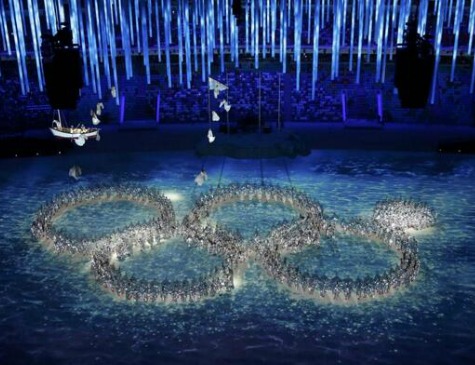The United States placed first for third-place finishes at Sochi. We’re #1–at being #3. It was a bronze medal kind of Olympic Games for Team USA, good but not great.
Sochi featured twelve more events than Vancouver. Americans won nine fewer medals. Even Sochi figure-skating judges could do that math. Vancouver>Sochi.
And since we’re on the topic of mathematics, some gold medals are more equal than others.
Most of these happen to be the hardware that won’t be coming home to America with its athletes. It’s not just that Americans didn’t stand atop the podium as much as they did the last time. The medals Americans won didn’t matter as much. Dutchman Sven Kramer’s gold for speedskating’s 5,000-meter race and American Sage Kotsenburg’s gold for men’s snowboarding slopestyle both weigh 1.17 pounds. Must we indulge the polite delusion that they both carry the same weight?
Medals in traditional Winter Olympics events–the ones where competitors can’t chew gum and win at the same time–proved scarce commodities for Americans at Sochi. In fact, if Sochi had staged only the contests featured in the first winter games at Chamonix in 1924, the entire 230-member American team would have ventured home with a single bronze medal.
Sochi featured six times the number of events as Chamonix, more than three times the number as Squaw Valley, and more than double the number as Calgary. Just as the International Olympic Committee (IOC) has diluted gold medals by making them almost wholly from silver, it has diluted the quadrennial event through a rapid expansion of events that few athletes actually compete in around the world.
Six of Team USA’s nine gold medals came in events plucked from the Winter X Games, an ESPN creation that so disproportionately appeals to Americans that its lingua franca–gnarly, dude, rad–stems from the lingua California, a la Jeff Spicoli ’82. Slopestyle, which awarded a third of our golds, didn’t exist as an Olympic event four years ago. Nearly half of the total American medal count came on snowboards, atop halfpipes, or in slopestyle. That’s not rad, not rad at all.
If the Russians had convinced the IOC to make vodka shots–the unofficial winter sport of Siberia–an Olympic event, Americans would immediately recognize this as a means of inflating the host country’s medal count. As it stands, Russians are more honest about their dishonesty, stealing medals the old-fashioned, Eastern Bloc way: owning judges. Americans do so by forcing obscure, made-in-America sports on the Olympics that few global viewers have seen let alone attempted. In this sense, snowboarding and such might be seen as a metaphor for the ugly, overlooked, less popular cousin of the summer games. Most of the world can’t get into curling, bobsledding, and biathlon because they’re so utterly foreign. Everyone has run a race or kicked a soccer ball. Who has ever shredded a halfpipe?
Surely no one will ever mistake Shaun White, who follows Sochi by touring with his rock band, as an athlete for Carl Lewis–or even Carl Weathers. But he’s a lot of fun–or at least he used to be before he cut his hair. And snowboarding, even if it’s relatively new, requires skill and qualifies as a legitimate sport. But so does a snowball fight. Can that be an event in Pyeongchang?
At least the Russians poked fun at their failures. In homage to the epic fail at the opening ceremonies, Sochi’s closing ceremonies deliberately featured four Olympic rings and that stubborn snowflake that refused to metamorphosize. American speedskaters blamed their performance on their suits, the elevation, the humidity–everything but themselves. Figure skater Jeremy Abbot threw a fit after finishing well out of medal contention. Winners don’t lose like that.
For American viewers, the Olympics remains about identifying with the stars. Ours flickered and faded in Sochi. Injury kept Lindsey Vonn from showing up. Fear prevented Shaun White from giving an attempt for an event in which he had qualified. Old Man Bode Miller limps home with a bronze.
It really wasn’t until the last week of the Olympics in which new stars outshined the old ones. Meryl Davis and Charlie White captured figure skating gold in the ice dance on Monday. Ted Ligety occupied the podium’s top spot on Wednesday in the giant slalom. But not until Friday, two days before Sochi’s flame fluttered out, did Americans finally meet their Apolo Ohno, their Mike Eruzione, their Dorothy Hammill for the Sochi games. Mikaela Shiffrin becoming the youngest Olympic gold medalist in the slalom becomes the face of the 2018 team. Here comes the Wheaties box, the trip to Disneyworld, the TMZ invasion of privacy. Americans, in contrast to their women’s hockey team, finished strong.
The Sochi spectacle made for an entertaining respite between the Super Bowl and March Madness. We suffer through winter by imprisoning ourselves indoors and packing on lard. Not, unfortunately, by sledding, skiing, and skating as the athletes did in Russia. So, we watched much in which we never participate. It’s not the fault of hockey, skiing, or luge that we’re too cold or too cowardly to try. But it is the reality that our lack of familiarity makes the winter games second fiddle–last place if you will–to the Summer Olympics. We would award a bronze medal to the winter games, if only a third season would lay claim to an Olympics.

COMMENTS
Please let us know if you're having issues with commenting.